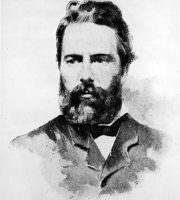by Herman Melville
Fervid he spake. And Ungar there
Appeared (if looks allow surmise)
In latent way to sympathise,
Yet wonder at the votary's air;
And frequent too he turned his face
To note the grotto, and compare
These haunted precincts with the guide,
As so to realise the place,
Or fact from fable to divide;
At times his changeful aspect wore
Touch of the look the simple shepherds bore.
The Tuscan marked; he pierced him through,
Yet gently, gifted with the clue —
Ascetic insight; and he caught
The lapse within the soldier's thought,
The favourable frame, nor missed
Appealing to it, to enlist
Or influence, or drop a seed
Which might some latter harvest breed.
Gently approaching him, he said:
" True sign you bear: your sword 's a cross."
Ungar but started, as at loss
To take the meaning, and yet led
To marvel how that mannered word
Did somehow slip into accord
With visitings that scarce might cleave —
Shadows, but shadows fugitive
He lifted up the steel: the blade
Was straight; the hilt, a bar: " 'Tis true;
A cross, it is a cross," he said;
And touched seemed, though 'twas hardly new.
Then glowed the other; and, again:
" Ignatius was a soldier too,
And Martin. 'Tis the pure disdain
Of life, or, holding life the real,
Still subject to a brave ideal —
'Tis this that makes the tent a porch
Whereby the warrior wins the church:
The habit of renouncing, yes,
'Tis good, a good preparedness. —
Our founder" — here he raised his eyes
As unto all the sanctities —
" Footing it near Rieti town,
Met a young knight on horseback, one
Named Angelo Tancredi: " Lo, "
He said, " Thy belt thou 'lt change for cord,
Thy spurs for mire, good Angelo,
And be a true knight of the Lord. "
And he, the cavalier — — " Aside
A brother of the cowl here drew
This ardent proselyting guide,
Detaining him in interview
About some matter. Ungar stood
Lost in his thoughts.
In neighbourhood
Derwent by Rolfe here chanced to bide;
And said: " It just occurs to me
As interesting in its way,
That these Franciscans steadily
Have been custodians of the Tomb
And Manger ever since the day
Of rescue under Godfrey's plume
Long centuries ago." Rolfe said:
" Ay; and appropriate seems it too
For the Franciscan retinue
To keep these places, since their head,
St. Francis, spite his scouted hood,
May claim more of similitude
To Christ than any man we know.
Through clouds of myth investing him —
Obscuring, yet attesting him,
He burns with the seraphic glow
And perfume of a holy flower.
Sweetness, simplicity, with power!
By love's true miracle of charm
He instituted a reform
(Not insurrection) which restored
For time the spirit of his Lord
On earth. If sad perversion came
Unto his order — what of that?
All Christianity shares the same:
Pure things men need adulterate
And so adapt them to the kind."
" Oh, oh! But I have grown resigned
To these vagaries. — And for him,
Assisi's saint — a good young man,
No doubt, and beautiful to limn;
Yes, something soft, Elysian;
Nay, rather, the transparent hue
Unearthly of a maiden tranced
In sleep somnambulic; no true
Colour of health; beauty enhanced
To enervation. In a word,
For all his charity divine,
Love, self-devotion, ardour fine —
Unmanly seems he!"
" Of our Lord
The same was said by Machiavel,
Or hinted, rather. Prithee, tell,
What is it to be manly ?"
" Why,
To be man-like" — and here the chest
Bold out he threw — " man at his best!"
" But even at best, one might reply,
Man is that thing of sad renown
Which moved a deity to come down
And save him. Lay not too much stress
Upon the carnal manliness:
The Christliness is better — higher;
And Francis owned it, the first friar.
Too orthodox is that?"
" See, see,"
Said Derwent, with kind air of one
Who would a brother's weak spot shun:
" Mark this most delicate drapery;
If woven by some royal dame —
God bless her and her tambour frame!"
Last updated March 26, 2023




